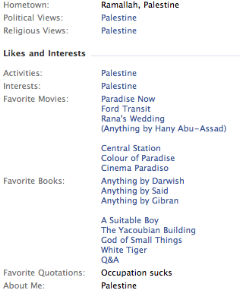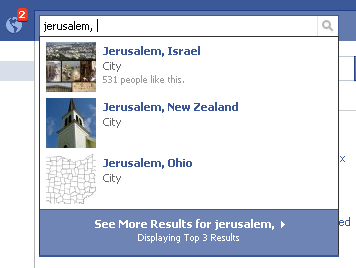When Facebook rolled out its latest feature [1], “Connections,” in April 2010, many users were confused by the changes. The opt-in feature, intended to create a broader sense of community around user interests, converts a user's listed interests [2], books, movies, and network into “likes,” linking the user to the community page for each topic.
In some cases, users have noted that their interests have gotten lost in translation on their way to becoming Connections. When Palestinian Facebook user Diana Buttu [3] was presented with the opt-in screen for Connections, she was shocked. Prior to the rollout of the new feature, her “info” page looked like this:

Diana Buttu's Facebook interests
The opt-in page Buttu was presented with for Connections, however, looked like this:

Buttu's interests and activities on the Connections opt-in page
A number of Diana's book and movie interests, listed outside of the standard format (e.g., “Anything by Gibran”), simply disappeared, while her “interests” and “activities,” both previously listed as “Palestine,” were changed to “Israel” (the text under the Israeli flags state “Israel – activities” and “Israel – interests”). Users who have added “Palestine” as an interest since the Connections feature was rolled out have been able to do so successfully, however.

With the new Connections feature, users must also link to the community page for their home location, or remove their location altogether. It appears from a search, however, that no community page exists “Jerusalem, Palestine,” meaning that Palestinians living there must either list their city as being in Israel, or remove their location altogether.

Facebook has faced controversy before for listing Golan Heights as being in Israel [4], barring Syrian users from listing their location as Syria. That decision was eventually overturned, but the Golan Heights community page [5] now uses Wikipedia information, which outlines the dispute over the Israeli-occupied territory.
A quick search for other disputed cities, including Grozny (Chechnya/Russia), Sokhumi (Abkhazia/Georgia) and Laayoune (Western Sahara/Morocco), shows inconsistencies. Grozny is listed twice, as “Grozny – city” (like the Golan Heights page) and “Grozny, Russia”, while Laayoune is listed only as Western Sahara (Morocco claims sovereignty over the Western Sahara).
While there are numerous reasons [6] to be concerned over Facebook's new feature, the site's foray into geopolitics is alarming for many users, particularly those who live in disputed areas. Whereas before, and on most sites, users are able to input their location as plain text (and thus are able to list it as anything they like, real or otherwise), Facebook's continued insistence on controlling user content–from their “real name” policy to these latest changes–should be cause for alarm.